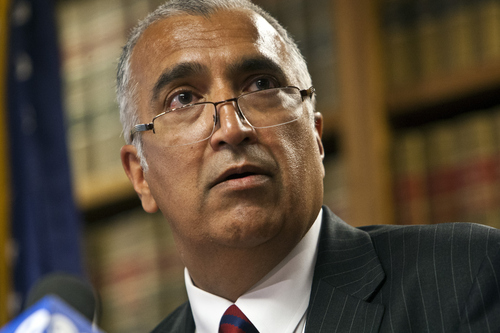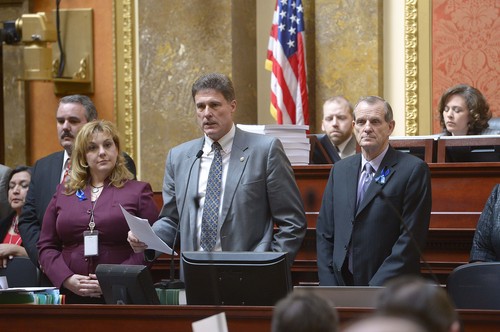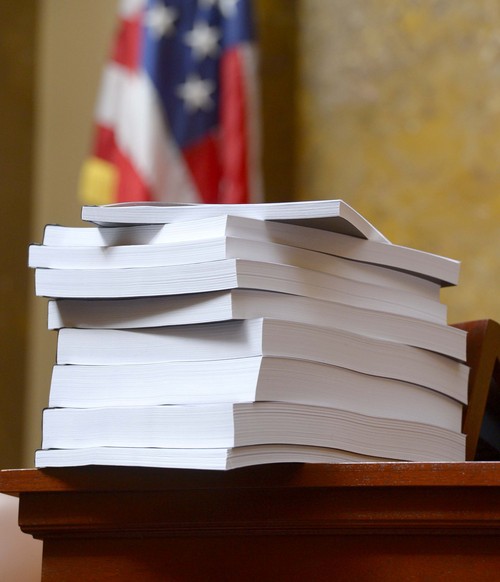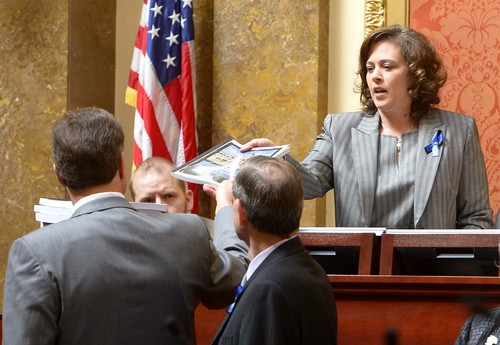This is an archived article that was published on sltrib.com in 2014, and information in the article may be outdated. It is provided only for personal research purposes and may not be reprinted.
Former Utah Attorney General John Swallow may have broken no fewer than eight laws in a widespread abuse of public trust, according to a Utah House Special Investigative Committee report released Wednesday.
The state's former top cop likely will face criminal charges as a result, experts predicted.
The report alleges Swallow had a "pay-for-play" relationship with wealthy friends and supporters for whom he would perform favors while hurting the integrity and reputation of his office and the justice system at large.
Swallow then took steps to conceal this conduct, the report states, by fabricating and destroying documents, manipulating the statements of others and misleading investigators.
Of the eight types of crimes investigators accuse Swallow of committing, several may have been committed more than once, according to the investigation.
Salt Lake County District Attorney Sim Gill and Davis County Attorney Troy Rawlings — who, along with state and federal investigators, are conducting ongoing criminal probes of Swallow, his predecessor Mark Shurtleff and others — declined to say Wednesday whether criminal charges against Swallow would be forthcoming.
"We're all working for the same conclusion: to be transparent and truthful to our citizens," Gill said, adding that building a criminal case against Swallow would be a "monumental task" requiring prosecutors to consider much more than the 206-page report and its more than 3,700 exhibits.
"Our challenge is not just to simply recognize what might be," Gill said, "but to make sure the quality and quantity of evidence is such that there's a likelihood of success at trial."
Among alleged criminal violations cited are instances of bribery, official misconduct, theft of services, obstruction of justice, evidence tampering, witness tampering, violating the Utah Government Records Access and Management Act and engaging in a pattern of unlawful activity.
Only one question remains unanswered in the House committee's report, according to Greg Skordas, a former chief deputy of the Salt Lake County attorney's office who is now in private practice:
"How do you not do something about this?" Skordas said. "If you're a prosecutor and you read this report, how do you not do something? Unless we, as a society decide that enough is enough — removal from office and public embarrassment. But I don't see that happening."
The allegations largely hinge on Swallow's conduct and relationships with two men: Jeremy Johnson, a St. George businessman who used his Swallow connection to seek favors from the office on behalf of his online poker business and later was indicted by federal prosecutors, and Richard Rawle, who allegedly used money from his payday loan company to fund attack ads against Swallow's political opponents in exchange for Swallow's favor.
In an effort to wipe the trail clean of his involvement with these unethical — and potentially criminal — practices, Swallow retroactively altered records, deleted documents and had his attorney author a statement on Rawle's behalf that indicated the former AG was not involved in brokering a deal in 2010 in which Johnson believed he was going to pay Senate Majority Leader Harry Reid $600,000 to make a federal investigation into his company go away, the report alleges.
This conduct is likely to land Swallow in court on several criminal counts, former Salt Lake County prosecutor Kent Morgan said.
"When you wipe out hard drives, when you make up stories about your computer and electronic equipment that are not true in that they suddenly fail to reveal information and documents that could implicate you in a crime, that's tampering with evidence," Morgan said. "If someone says, 'Is this your computer?' You can say, 'None of your business, ask my lawyer.' But [Swallow] did so much more than that. After he represented he would provide documents and information, he did provide it, but it was altered and misleading."
There's no telling how many counts of obstructing justice or tampering with evidence Swallow could face if prosecutors decide to pursue the crimes suggested in the report.
Every time a file or an email was destroyed, experts said, that amounts to a specific crime.
"There could literally be hundreds of counts," Skordas said. "No prosecutor would do it that way but if you want to get technical, every time [Swallow] hit click, and the question on the computer asks if you're sure you want to delete that document? That's a crime."
Swallow has maintained his technology malfunctions happened without his knowledge or assistance, and that he tried to recover the information investigators were after.
"To suggest there was some nefarious plot afoot to destroy potential evidence for a committee many months before it was established is simply untrue and patently unfair," Swallow's attorney Rod Snow wrote earlier this month in a letter to the House committee. "We support any legislation that prohibits by making it a felony to deliberately destroy evidence to avoid the production of such evidence in Court or an authorized investigation. That would pattern federal law and it makes good law and good sense. That is not what happened here."
The letter called into question the motives and biases of the investigative committee, while maintaining Swallow's innocence of all alleged wrongdoing.
Snow also noted the U.S. Department of Justice and the Utah State Bar investigated Swallow and declined to take action, although the bar said Wednesday it was continuing its investigation based on the House committee's findings.
The Bar, which oversees attorney conduct and ethics violations, could ultimately take their findings to the Utah Supreme Court, which would have the latitude to discipline Utah's former top cop as it sees fit, including directing the Bar to file a civil suit that ultimately could lead to Swallow's license to practice law being suspended or revoked.
Twitter: @Marissa_Jae —
Report cites possible legal violations
Former Utah Attorney General John Swallow may have committed eight or more crimes, according to the Utah House Special Investigative Committee report. They are:
Bribery • A public officer may not "knowingly receive, accept, take, seek or solicit ... a gift of substantial value" that would influence impartiality or cause a reasonable person to believe it is a reward. A public official may also not accept such gifts if they have been or may be "involved" in any governmental action involving the donor. Prosecuted as a second- or third-degree felony.
Official misconduct • A public official who, "with an intent to benefit himself or to harm another," may not commit an act allegedly on behalf of his office while circumventing his or her duties. Prosecuted as a misdemeanor.
Theft of services • By depriving the state of his time and services while he was performing acts that did not benefit the state's interests, Swallow may have "diverted services to his own benefit." May be prosecuted as a misdemeanor or felony.
Obstruction of justice • A person may not act to hinder, delay or prevent an investigation from moving forward. May be prosecuted as a misdemeanor or felony.
Evidence tampering • This involves a person, "believing that an official proceeding or investigation is pending or about to be instituted," altering, concealing or disposing of evidence such that it may prevent the investigation from proceeding. May be prosecuted as a misdemeanor or felony.
Witness tampering • This occurs when a personfalsely informs or withholds testimony from a person in an investigation, such as Swallow's alleged creation of Richard Rawle's dying declaration, which absolved the former AG of wrongdoing. May be prosecuted as a misdemeanor or felony.
Violating Utah's Government Records Access and Management Act • Purposefully mutilating, destroying or damaging recorded copies of information that may be public information and belongs to the government is a legal violation. Prosecuted as a misdemeanor.
Pattern of unlawful activity • Engaging in a ongoing pattern of activity including bribery, threats and official misconduct constitutes unlawful activity. Prosecuted as a felony.









